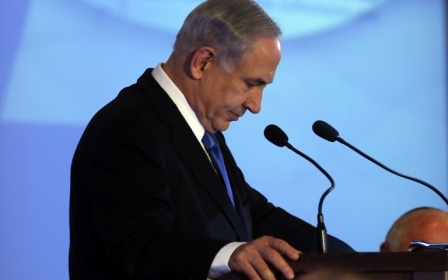Close to Washington, far from Tel Aviv

Just before delivering his speech to the US Congress early this week, the Israeli Prime Minister Benyamin Netanyahu was given a symbolic gift by his host, the Speaker of the House John Boehner: a bust of Winston Churchill, the only other foreign leader who had the privilege to address the American Congress three times. Netanyahu himself did not mention the British leader in his speech, but the message was clear: The danger which hovers over Israel now is no less than the danger posed by the Nazis in December 1941, when Churchill addressed Congress for the first time.
But, as if the example of World War Two was not enough for his audience on Capitol Hill and in Israel, Netanyahu rushed to add another grim chapter from Jewish history: the plot by Haman, the Persian viceroy, to annihilate all Jews in his kingdom. The now-day heirs of Haman in Persia/Iran now plot again to kill all Jews, according to Netanyahu. He reminded his audience that in these very days, in Purim, Jews are celebrating their redemption from Haman's plot. What they need now is a new redemption, a new redeemer, a new Churchill, a new Netanyahu.
By combining the old story related in the Book of Esther with the ghosts of the holocaust in World War Two, Netanyahu is playing on one the basic characteristic of Jewish collective memory: the fear of the stranger. One of the main motivations behind the Zionist movement was to cure the Jews of this fear, acquired by the accumulated experience of hundreds of years of persecution in the diaspora. But this effort failed. Fear, and the politics built on fear, remains one of the defining features in Israeli society.
Playing to the old script
Iran fits very well into this script. A country where Israel is described as "the small Satan", where slogans of "death to Israel" are heard in almost every demonstration and where Israeli flags are burnt regularly in the streets, is surely something to fear from. The fact that Iran is so involved in anti-Israeli rhetoric without even having a common border with Israel and without participating directly in any of the Israeli-Arab wars, turns its regime, in the eyes of almost every Israeli, into a manifestation of pure hatred for the Jewish people.
Netanyahu, therefore, did not require too much effort in order to depict Iran, with its nuclear programme, as a mortal danger to Israel. Nearly all Israeli politicians, right or left, would agree with him on this issue. Aided by the over-sympathetic audience in the Republican-dominated Congress, his undeniable rhetorical ability and his flawless English, no wonder that his speech was hailed in Israeli media as "perfect". It would not be presumptuous to claim that 70 to 80 percent of the public in Israel identified with its content and with its tone.
It is still too early to see what effect this speech will have on the prospects of achieving an agreement with Iran on its nuclear programme. It may take time before we will have an answer. But if the immediate goal of the speech was to gain political support in Israel two weeks before election day, then the results fell short of expectations.
Confused position on Iran
The standing of Netanyahu's party, Likud, in the polls did not change dramatically. At best, it is on an even standing with the Zionist Camp led by Yitzhak Hertzog at 23 seats, far from the needed 61-seat majority. At worse, it trails behind Hertzog by one or two seats. Netanyahu is still considered to have better chances to form a government after 17 March, but his task will not be easy.
There are several reasons for this disappointing result. Before going to Washington, Netanyahu displayed an uncompromising mood towards any deal with Iran. In his speech before Congress, the message was much more mild. Netanyahu did claim that the coming deal would pave the way for a nuclear Iran instead of preventing it from doing so, but he did not reject the very idea of reaching a compromise with the regime in Tehran.
This was a little confusing. If Iran is indeed the incarnation of evil in modern politics, then any deal with it is practically and morally wrong. But if all that is needed is a better deal with Tehran, then it would be more practical to achieve this goal by cooperating with President Barack Obama's administration rather than confronting and challenging it through a contested speech in Congress. Instead of sending out a cry of war, Netanyahu almost acknowledged the failure of this approach by his very speech.
Adding to this sense of futility were the constant reminders by senior veterans of Israel's defence establishment that the military option against Iran is not really relevant. The last among them was Meir Dagan, ex-head of Mossad, who flooded the Israeli press with interviews in which he openly opposed such an option. Even the outgoing Chief of Staff, Major General Benny Gantz, hinted in a television interview that he advised Netanyahu not to attack Iran and that his advice was accepted. With this background, Netanyahu buoyant rhetoric in Congress seemed rather vain.
Out of touch
Netanyahu may be truly obsessed with the Iranian threat. He began warning against an Iranian nuclear weapon already in the mid-1990s and never really stopped. But even if his concern is genuine, it is impossible to ignore the use he is making of this threat for political gains.
Two weeks ago, after a thorough official report showed how the governments led by Netanyahu neglected to tackle the rise in house prices, he wrote in his Facebook account: "When we talk about housing prices, about the cost of living, I cannot forget life itself and the biggest challenge to our lives as citizens of Israel is the threat of Iran arming with nuclear weapon." These remarks were so sharply criticized for being out of touch with the reality of everyday life in Israel that Netanyahu later erased any reference to Iran in this post.
This maybe an indication of Netanyahu's biggest political problem right now. His campaign is focusing on him as being the protective shield Israel needs in order to face all outside threats, from Iran and Hezbollah to Hamas and even Islamic State (IS). He has no quarrel with most Israelis in describing all of them as enemies of Israel who only wish its destruction.
It's the cost of living, stupid
But many Israelis, maybe too many in Netanyahu's eyes, do not share his conviction that these threats are imminent, that they effect their daily life to an extent that they will give their vote for the man vouched to fight against them. Israelis do seem more concerned with the cost of living and with their inability to buy a house more than with the Iranian threat. Even more so when Netanyahu himself effectively admits that he failed to stop Iran's progress towards a nuclear bomb and when people like Dagan and Gantz are explaining to them that an attack on Iran is useless.
Netanyahu said time and again that he views Churchill as his hero and as an example to follow. This is why it was so important for him to stress that by appearing before Congress for the third time, he is equalling Churchill's record. But he might have forgotten that Churchill lost the British elections right after the end of World War Two, when his popularity was deemed to be the highest and against a supposedly uninspiring rival, Labour leader Clement Attlee. Will Netanyahu follow his icon also in his fall? The answer will be given in ten days' time.
- Meron Rapoport is an Israeli journalist and writer, winner of the Napoli International Prize for Journalism for a inquiry about the stealing of olive trees from their Palestinian owners. He is ex-head of the News Department in Haaertz, and now an independent journalist.
The views expressed in this article belong to the author and do not necessarily reflect the editorial policy of Middle East Eye.
Photo: An Ultra-Orthodox Jewish man walks past a giant poster of Israeli Prime Minister Benjamin Netanyahu, Likud party's candidate running for general elections, in Jerusalem, on March 5, 2015 (AFP)
New MEE newsletter: Jerusalem Dispatch
Sign up to get the latest insights and analysis on Israel-Palestine, alongside Turkey Unpacked and other MEE newsletters
Middle East Eye delivers independent and unrivalled coverage and analysis of the Middle East, North Africa and beyond. To learn more about republishing this content and the associated fees, please fill out this form. More about MEE can be found here.





